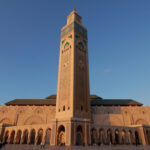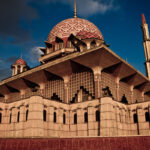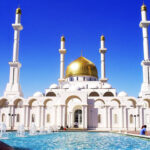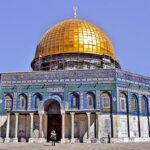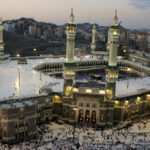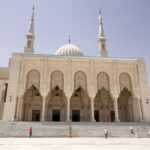Army.
In the time of Abu Bakr, no standing army or mercenary force was kept by the State. In the case of any emergency, recruiting parties were sent to the various tribes to recruit volunteers.
Inspired by religious fervor for ‘Jihad’ and for patriotic and economic considerations, volunteers willingly enrolled themselves in large numbers whenever there was a call to arms. On this basis for every military expedition, a new militia was raised, and when the expedition was over, the militia was disbanded.
Military service.
Military service constituted the noblest of professions in the eyes of the Arabs. “Jihad” was according to the tenets of Islam incumbent on every adult male Muslim, and the entire community was regarded as the army of Islam. No salary was paid to the soldiers. They were allowed a share in the spoils of war. During the caliphate of Abu Bakr, so great were the spoils of war, particularly in the campaigns in Iraq and Syria that every soldier amassed so much wealth as sufficed for his lifetime.
The Caliph.
As the Caliph, Abu Bakr was the Generalissimo or the Supreme Commander. A commander was appointed for each column by the Caliph. The Caliph personally awarded the standard to each commander.
The commander was responsible to the Caliph, and the Caliph issued directions from time to time to direct military operations. The commander as the representative of the Caliph presided at daily prayers, and all soldiers in the column were required to attend the congregation.
Composition of the army.
The army was composed of cavalry and infantry. The cavalry was armed with shields, swords and long lances. The infantry was armed with shields, and bows. The formation of the infantry was generally in line three deep with lancers in front and the archers in the rear.
The cavalry was usually posted on the flanks. The cavalrymen wore chain armor with steel helmets. The infantrymen were clad in tight fitting tunics. The armies were always well provisioned. Long marches were made on camels.
March to the battlefield.
The army marched to the battlefield chanting verses from the Holy Quran. Orators were attached to every column who exhorted the soldiers to do their duty to Islam, and to live up to the standards of the Arab ideals of chivalry. The Muslims marched to the battlefield with the beat of drums. They delivered the attacks with the shouts of “Allah-o-Akbar”.
Offer to the enemy.
Before attack, the enemy was always offered three alternatives, namely acceptance of Islam, payment of Jizya or decision by sword. Where a people accepted Islam, they were treated as part and parcel of the Muslim community and no conditions were imposed.
Where a people wished to stick to their faith, and pay Jizya they were allowed cultural autonomy and were guaranteed full protection. Where a people chose to fight, the Muslim attacks were always violent, and in many cases the entire force of the enemy was exterminated. Those who were taken captive were either released on ransom or kept as slaves.
On the battlefield.
All battles began with personal duels between chosen warriors from both sides. In such duels the Muslim champions always won. After such duels the battle developed into a general hand to hand fight in which all the troops took part. On the battlefield the army divided itself in five units called “Khamis”.
These were the center, the right wing, the left wing, the vanguard and the rear guard. The flanks were covered by the cavalry. The archers were so disposed as to cover both cavalry and infantry. The organization of the army was based on tribal units. Each tribe had its own distinct contingent with its own leader and banner. Many tribes marched to the battlefield with their families in their train. There were special contingents of women. They were employed as nurses, cooks, store guards, and water carriers.
Code of conduct.
The soldiers were required to follow strict code of conduct. They were required to observe strict discipline and scrupulously obey the command of their superiors. Persons found guilty of breach of discipline were punished. Where a soldier displayed any cowardice on the battlefield he was subjected to the humiliation of his turban being taken off his head.
The soldiers had strict orders not to kill monks, priests, women, children, the slaves, the sick and the aged. They were not to sack any town or village, or destroy or ravage any arable land. There was to be no wanton pillaging, no trees were to be cut, and no crops were to be burnt or destroyed. No corpses of the enemy were to be burnt or mutilated. The dead of the enemy were to be buried with due respect, and where requests were made for particular corpses by the enemy, these were to be freely handed over.
Victories of the Muslims.
During the caliphate of Abu Bakr all the military campaigns undertaken by the Muslims ended in their victory. The Muslims fought against forces superior to them in strength and numbers, but victory always lay with the Muslims. The Muslims won reputation for their invincibility.
Even the biased western writers have been forced to admit that during the period of the caliphate of Abu Bakr, the desert of Arabia became the nursery of heroes. The story of the Muslim conquest of Iraq and Syria, the miraculous exploits of the Muslim heroes, and the manner in which they dealt blows after blows on the armies of Persia and Byzantium read like some fiction from the Arabian Nights. And if truth were to be ever stranger than fiction, that is so in the case of Muslim conquests under Abu Bakr,
Causes of Muslim victories.
The main causes of the victories of the Muslims during the caliphate of Abu Bakr were the high morale of the Muslim soldiers, their religious enthusiasm, their endurance, their mobility, and the superb directions of Abu Bakr. To these basic causes may be added the unique generalship of Khalid, heroism of Muslim soldiers and the blessings of Allah and His Prophet.
Visits: 0








